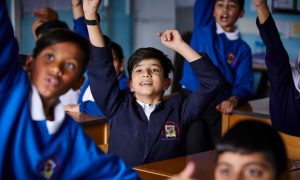[cmsms_row data_width=”boxed” data_padding_left=”3″ data_padding_right=”3″ data_color=”default” data_bg_position=”top center” data_bg_repeat=”no-repeat” data_bg_attachment=”scroll” data_bg_size=”cover” data_bg_parallax_ratio=”0.5″ data_padding_top=”0″ data_padding_bottom=”50″][cmsms_column data_width=”1/1″][cmsms_heading type=”h1″ font_weight=”normal” font_style=”normal” text_align=”left” margin_top=”0″ margin_bottom=”20″ animation_delay=”0″]How to improve the school results: not extra maths but music, loads of it[/cmsms_heading][/cmsms_column][/cmsms_row][cmsms_row data_width=”boxed” data_padding_left=”3″ data_padding_right=”3″ data_color=”default” data_bg_position=”top center” data_bg_repeat=”no-repeat” data_bg_attachment=”scroll” data_bg_size=”cover” data_bg_parallax_ratio=”0.5″ data_padding_top=”0″ data_padding_bottom=”50″][cmsms_column data_width=”1/1″][cmsms_text animation_delay=”0″]

Bradford primary school wants the world to know its newfound SATs success is down to giving all children up to six hours of music a week.
Abiha Nasir, aged nine, walks quietly into the small classroom, takes a seat, adjusts her hijab and picks up the drumsticks. A shy smile spreads across her face as she begins to play.
She was just five when she turned up at Feversham primary academy’s after-school clubs, leaving teachers astounded by her musical ability and how her confidence grew with an instrument in hand. Last year, Abiha successfully auditioned for Bradford’s gifted and talented music programme for primary school children, the first Muslim girl to do so. The assessor recorded only one word in her notes: “Wow!”
Abiha’s teachers say her talent might have gone unspotted in many schools, where subjects such as music and art are being squeezed out by pressure to reach Sats targets and climb league tables.
But at Feversham, the headteacher, Naveed Idrees, has embedded music, drama and art into every part of the school day, with up to six hours of music a week for every child, and with remarkable results. Seven years ago Feversham was in special measures and making headlines for all the wrong reasons. Today it is rated “good” by Ofsted and is in the top 10% nationally for pupil progress in reading, writing and maths, according to the most recent data. In 2011, the school was 3.2 percentage points behind the national average in English. This year 74% of its pupils achieved the expected standard in reading, writing and maths, against a national average of 53%. It is 7.1 points above the average for reading and 3.4 above for writing. In maths, the school was 2.4 points behind the national average in 2011 and is now 6.5 above it. Its results for disadvantaged pupils are well above average.
A “tiny percentage” of Muslim parents were concerned about their children listening to pop songs or Christian music, according to Jimmy Rotheram, the school’s energetic music coordinator, but he says those concerns disappeared when they saw the progress their children were making.Once the school’s end-of-year concert would be attended only by a handful of sceptical parents, now it sells out every year. The school’s attendance has increased to 98%, as the amount of music taught to each pupil has risen. Every child will get at least two hours of music a week. As a bare minimum, each child gets a 30-minute music lesson, a half-hour follow-up lesson, plus a one-hour music assembly with a guest musician and group singing. Songs are incorporated into other classes and pupils often sing about times tables, or history.
The school bases its method on the Kodály approach, which involves teaching children to learn, subconsciously at first, through playing musical games. Children learn rhythm, hand signs and movement, for example, in a way that will help their reading, writing and maths. Idrees says teachers have found that asking children to memorise passages of Shakespeare’s The Tempest, for example, improves reading and writing.
“My hope is that headteachers and people holding purse strings, possibly even the people who make important decisions in the government, will read about our school and realise that creative subjects are not mere add-ons but essential for the progress of all pupils.”
Back in class, Abiha bursts into another impressive drum solo – so loud it can be heard from the playground outside. She practises at home, she explains, but only on her dad’s PS3 drum kit and on a tablet computer. Soon she hopes to upgrade to the real thing: “Now he’s going to sell that [PS3] drum kit and buy a real one. He’s making a different room with noise-proofed walls because the neighbours might report us.”
[/cmsms_text][/cmsms_column][/cmsms_row]
